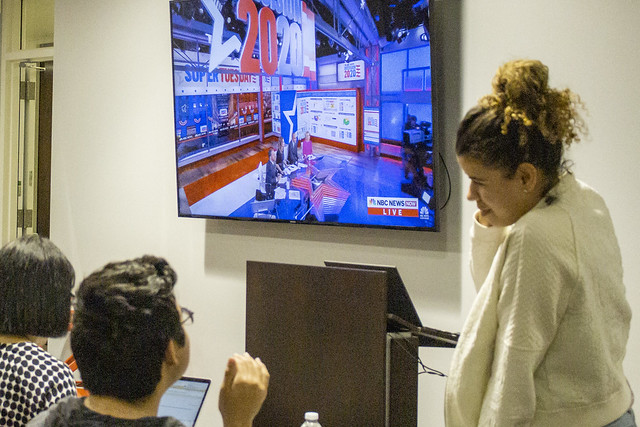By Les Dunseith
It was a UCLA Luskin commencement ceremony unlike any other — delivered remotely by keynote speaker John A. Pérez to honor 281 graduates scattered across the nation and around the world amid a pandemic.
“Clearly, these are not ordinary times,” Pérez said in his remarks, which remain available online and had been seen by a total of 1,265 new graduates and their loved ones as of midday Monday after the ceremony. The impact of the COVID-19 health crisis was obvious in the virtual setting, but Pérez, chair of the University of California Board of Regents and former speaker of the California Assembly, also took note of the political upheaval that has led hundreds of thousands of protesters worldwide to march for racial justice in recent weeks.
“My message to you today is also going to be somewhat different than usual. It has to be,” Pérez said. “It has to be different for George Floyd, for Breonna Taylor, for Stephon Clark and Sandra Bland and Eric Garner. For Sean Monterrosa and Manuel Ellis. And for Emmett Till and James Chaney and countless others — known and unknown — whose lives have been taken by the systemic racism that is the original sin and ongoing shame of our great nation.”
The new social welfare, planning and policy graduates earned their graduate degrees in extraordinary circumstances at a time that UCLA Luskin Dean Gary Segura views as a pivotal moment in the country’s history. He congratulated the Class of 2020 and also noted the high expectations they carry into their futures.
“This celebration is partly about what you have accomplished, but it is also about what you have yet to do,” said Segura, thanking the new graduates “for all that we expect you to do with all that you’ve learned.”
The virtual platform incorporated several wrinkles that set the 2020 celebration apart from previous UCLA Luskin graduations. In addition to the recorded remarks by Segura and Pérez, video presentations from California Gov. Gavin Newsom and his wife, Jennifer Siebel Newsom, UC President Janet Napolitano and UCLA Chancellor Gene Block were woven into the online presentation that was made available to all graduates.
Other aspects of the ceremony were able to be customized for each of the three departments that awarded degrees. So, Chair Laura S. Abrams spoke to the Social Welfare graduates, Chair Vinit Mukhija addressed the Urban Planning Class of 2020, and Chair Martin Gilens offered advice and congratulations to the new Public Policy alumni.
Instead of the past tradition in which names of individual graduates were read as they walked across the stage at Royce Hall to be handed a diploma, this year’s graduating students got a few moments of dedicated screen time to themselves. Each graduate’s name appeared on screen as part of the departmental ceremony, often accompanied by a photo and a personal message of thanks or inspiration provided by the graduating student as a text message or a video clip — or both. And an online “Kudobard” allowed family and friends to offer messages of congratulations to the Class of 2020.
The presentations by the student speakers were also unique to each department this year. All three spoke of the memorable circumstances that they and their classmates experienced while wrapping up their graduate degrees during such an extraordinary time in history.
“No one wanted this. No one wants to live in this type of world,” said Social Welfare speaker Akinyi Shapiro, who views her graduation as a time for both celebration and reflection. “Listen to those who are being attacked for nothing other than the color of their skin. Decide who we want to be as social workers, how we’re going to change our communities and commit to anti-oppressive practices that will make this country better.”
Amy Zhou noted that the stay-at-home order in Los Angeles took place just as the winter quarter was winding up at UCLA. “We had no idea that the last time my classmates and I would see each other at the end of the winter quarter would be the last time that we would see each other in person as a graduating class.”
Zhou took advantage of the virtual platform to include a series of video clips that showed her and her classmates pledging solidarity in their dedication to practice planning in a manner that will uplift their communities. “When one falls, we all fall,” they conclude, their voices in unison. “When one rises, we all rise.”
As with any commencement, the virtual ceremony was also an opportunity for the graduating students to acknowledge their mentors — the faculty, friends and, especially, family members who have helped them along their journeys.
“Muchisimas gracias,” said Kassandra Hernandez of Public Policy during her commencement remarks. “Thank you, mom and dad, for all that you’ve given me — all the sacrifices you have made for me.”
Hernandez then addressed her peers. “You are ready to take on the world and cause some change because we all know that that’s why we came to Luskin — to cause change.”
In his keynote address, Pérez also spoke of change. He talked about his time as a leader in California’s government, pointing to accomplishments such as health care reform and the creation of the state’s Rainy Day Fund. That financial reserve had grown to about $16 billion by the time of the pandemic, he noted, helping the current Legislature and governor lessen the economic damage from the COVID-19 downturn.
In Pérez’s view, making a meaningful difference to society requires not only a vision, but perseverance.
“As graduates of one of the nation’s premier schools for progressive planning and policy, you need to be among the leaders. Make ripples. Make waves,” he said. “Push yourself. Push the system. And when you think you’ve pushed enough, take a step, take a pause, and then push some more.”

